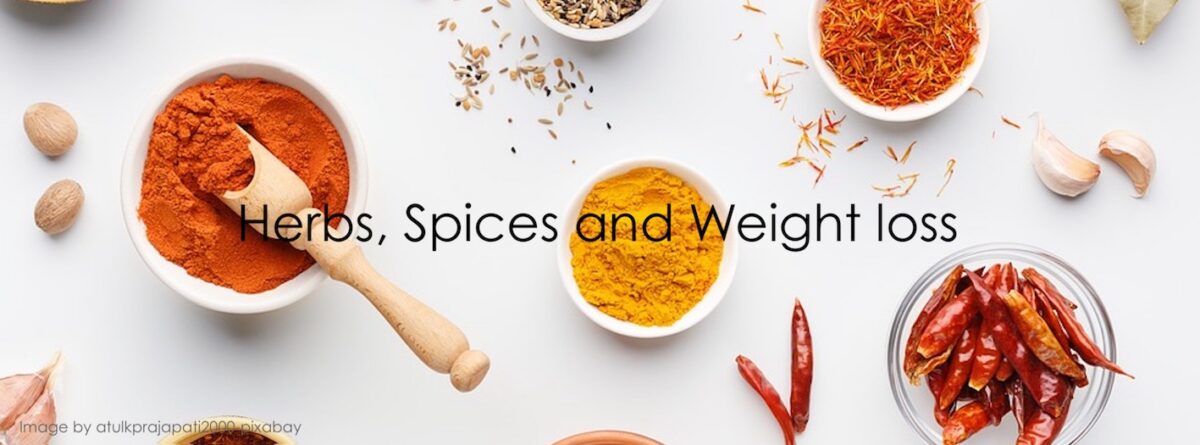Todays post is about herbs, spices and weight loss, a topic suggested by one of my readers. There are several herbs and spices that are used in commercial weight loss formulas. The most popular or well known are green tea and cayenne pepper. However, there are many other herbs and spices that have been used for thousands of years.
History
The Ancient Chinese used remedies for weight loss. Traditionally, this was in the form of raw herbs that were boiled and then consumed. This method is still followed in most hospitals in China today. Ayurvedic medicine uses certain herbs alone or in synergistic combinations to increase the possibility of treating obesity. Ayurveda is one of the world’s oldest holistic healing systems. It was developed more than 3,000 years ago in India. Modern scientists have put some of these ancient herbs and spices to the test. In a study completed by the South China Agricultural University, the anti-obesity effect of eight common spices were reviewed and evaluated. They found a variety of naturally occurring bioactive ingredients in these spices have weight-loss effects. The spices put to the test were cinnamon, rosemary, ginger, pepper, saffron, garlic, onion and turmeric.
Cinnamon
This classic aromatic spice is rich in antioxidants and offers several health benefits. In regards to weight control, cinnamon is effective in stabilizing blood sugar, which may help reduce appetite and hunger. It also has an affect on the levels of certain digestive enzymes to slow the breakdown of carbohydrates.
Rosemary
A fragrant evergreen plant, which has been used for hundreds of years for its medicinal benefits. Rosemary is naturally rich in carnosic acid, a substance that inhibits the formation of fat cells. Scientific studies have concluded that rosemary extracts can be used as a preventive treatment against metabolic disorders.
Ginger
The results of several studies indicate that supplementing the diet with ginger significantly decreases body weight. It does this by increasing thermogenesis and increasing the breakdown of fats. It also suppresses the formation of fat, inhibits fat absorption, and controls appetite.
Pepper – Cayenne and Black
Cayenne contains capsaicin, which has multiple benefits for metabolic health, especially for weight loss in obese individuals. Capsaicin plays a critical role in the regulation of metabolic health for the whole body, including body weight and glucose metabolism. Cayenne also raises body temp, increasing thermogenesis and helping to boost metabolism. Adding red peppers to your diet can suppress energy intake and reduce appetite. Cousin to cayenne pepper, black pepper is rich in piperine, which gives black pepper its unique flavour. Piperine creates anti-obesity activity without any change in appetite. The spice has also been shown to block the formation of new fat cells.
Saffron
Saffron is the stigma (the female organ) of an autumn flowering crocus (Crocus sativus). It has been used in both in Iranian medicine and modern medicine to reduce appetite. In a study using rats on a high fat diet, saffron extract significantly decreased food consumption. It also significantly reduced the rate of body weight gain.
Garlic
Garlic is traditionally used to treat infection, colds, diabetes and heart disease. Clinically, it has been evaluated for lowering blood pressure, cholesterol, and glucose concentration. Recently is has been linked with weight loss in a study that fed garlic to mice. After 7 weeks the mice had reduced body weights and fat stores. The garlic had also reduced the effects of an unhealthy diet on their blood and protected the liver from damage.
Onion
Onion stimulates bile acid production by the liver. Bile and bile acids play a major role in fat digestion and absorption. A study by the Korea Institute of Oriental Medicine concluded that Welsh onion extracts have potential for weight control in obesity.
Turmeric
This spice is already known for fighting inflammation but it may also help the body burn fat. Turmeric contains a highly beneficial compound called ‘curcumin’. This increases body heat, which, in turn, can boost metabolism. Over 20 scientific studies have been conducted to assess the influence of curcumin intake on weight among patients with metabolic syndrome and related disorders. The results showed that Curcumin intake significantly reduced body mass index.
(Sources – https://www.ncbi.nlm.nih.gov, https://www.sciencedirect.com, https://www.hindawi.com, https://www.researchgate.net )
I hope that this information has given you some ideas on how you can spice up your diet for weight loss.
Till the next post,
Live clean n prosper.


